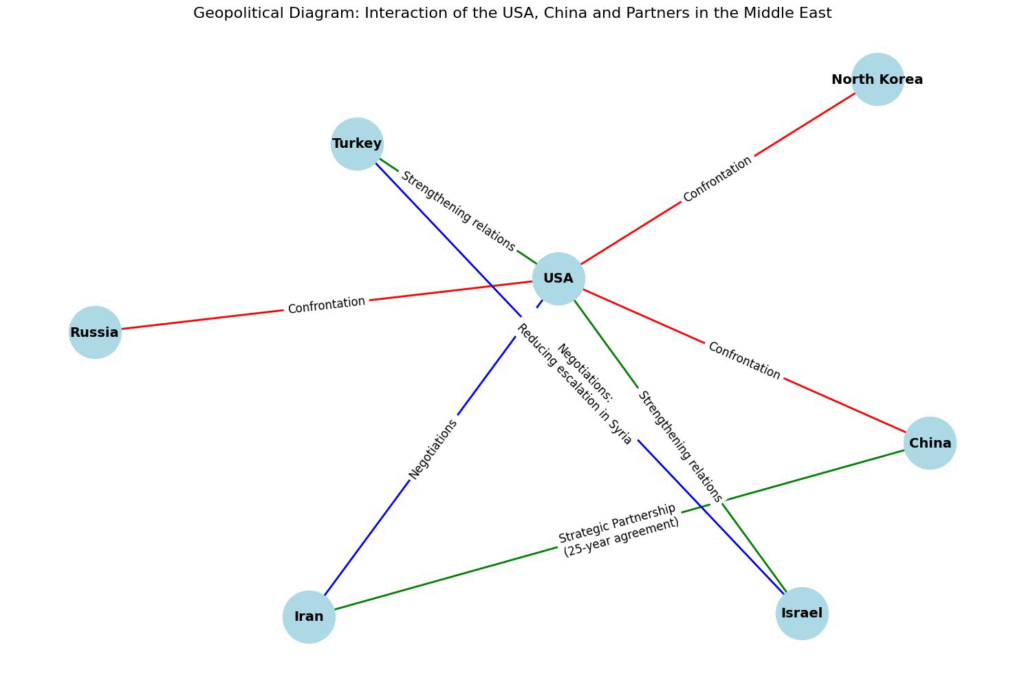Reconciling the Middle East, the U.S. Is Fighting China

The Trump administration’s approach is driven by a desire to dismantle the emerging geopolitical bloc—Russia, China, Iran, and North Korea—viewed as a coordinated challenge to Western dominance. Washington’s shift in Middle-East policy—aimed at improving or normalizing ties with Turkey, Israel, and Iran—seeks not only to stabilize the region but also to curb China’s regional influence, preventing Beijing from evolving beyond an economic actor into a geopolitical one. Yet by creating a fragile equilibrium in the Middle East, the United States risks giving China a long-term advantage, allowing Beijing to wait for the moment when the U.S. strategy falters.

DEEP PARTNERSHIP WITH IRAN: THE CORNERSTONE OF BEIJING’S MIDDLE-EAST STRATEGY
Sino-Iranian relations, cemented in March 2021 by a 25-year Comprehensive Strategic Partnership Agreement providing for nearly US $400 billion in Chinese investments, aim to mitigate the impact of international sanctions and develop Iran’s economy despite Western isolation.
The two countries also share a common narrative of resisting perceived Western domination, fostering mutual dependence and complicating any attempt to alter the existing regional alignment.
These ties, however, have clear limits. A striking example is the barter trade between Iran and China. In 2021, Chinese firms exported US $2 million in auto parts to Iran in exchange for pistachios of equal value. Historically, Iran has swapped its oil for Chinese goods and services, including construction work, consumer products, and machinery.
Iranian oil exports to China are often paid for in yuan, which Tehran then spends on Chinese goods because of restrictions on using that currency outside China—deepening Iran’s dependence on Beijing.
For this reason, better relations with the United States—especially after the fall of the Assad regime—are crucial for Iran. A second round of U.S.–Iran talks is scheduled for 19 April in Rome, and negotiators from both countries may sit in the same room.
TURKISH-ISRAELI TALKS CURB IRAN’S REACH AND BOLSTER U.S. PRESENCE
Talks between Turkey and Israel, launched on 9 April 2025 in Azerbaijan, aim to prevent military escalation in Syria by creating communication channels to avoid accidental clashes—especially after Israel’s firm statements that foreign troop movements into strategically vital areas are unacceptable.
Turkish President Recep Tayyip Erdoğan views preserving relations with Israel as key to fulfilling Turkey’s regional and global ambitions, aligning with U.S. interests that frame the Middle East through the lens of competition with China.
Overall, the U.S. strategy seeks to strengthen alliances that favor American interests and to break dependencies that allow China to deepen its influence in the region—reflected in the recent sharp tariff hikes on Chinese goods, even as Beijing leverages its relationships with Iran, Russia, and North Korea to promote a new international order.
CONCLUSION
In sum, the United States aims to establish a delicate balance in the Middle East that preserves China’s economic presence while limiting its geopolitical reach. Yet if this strategy fails, China may exploit a decline in U.S. authority in the region.